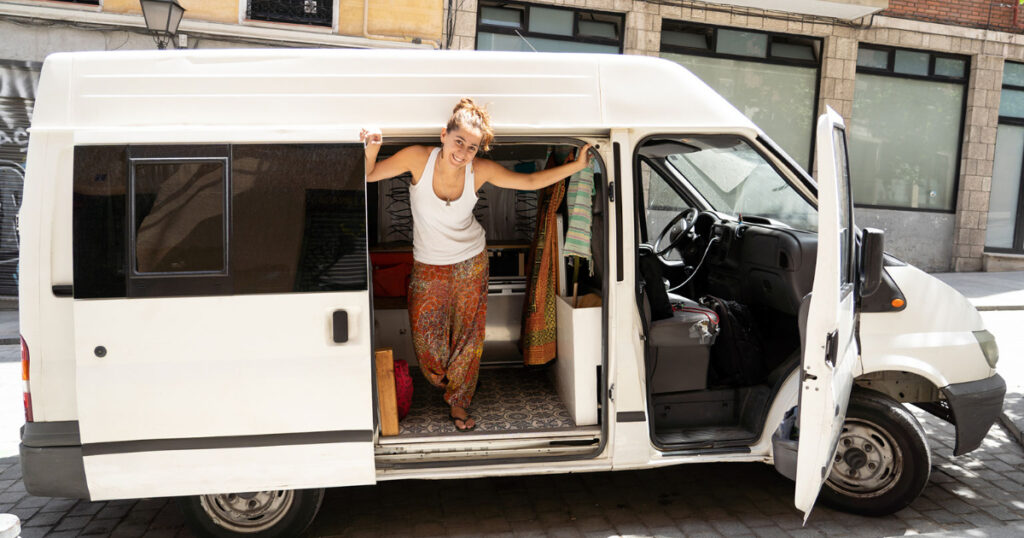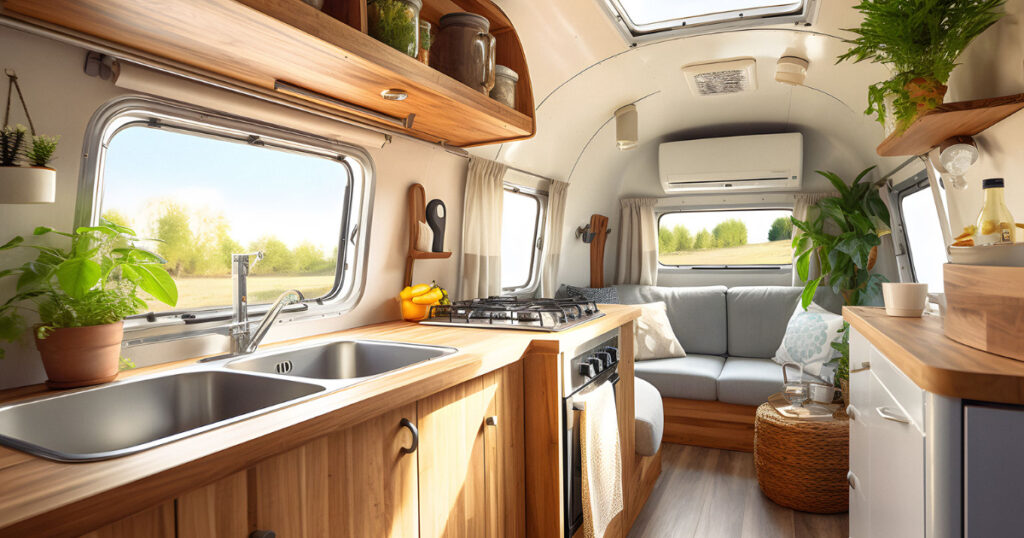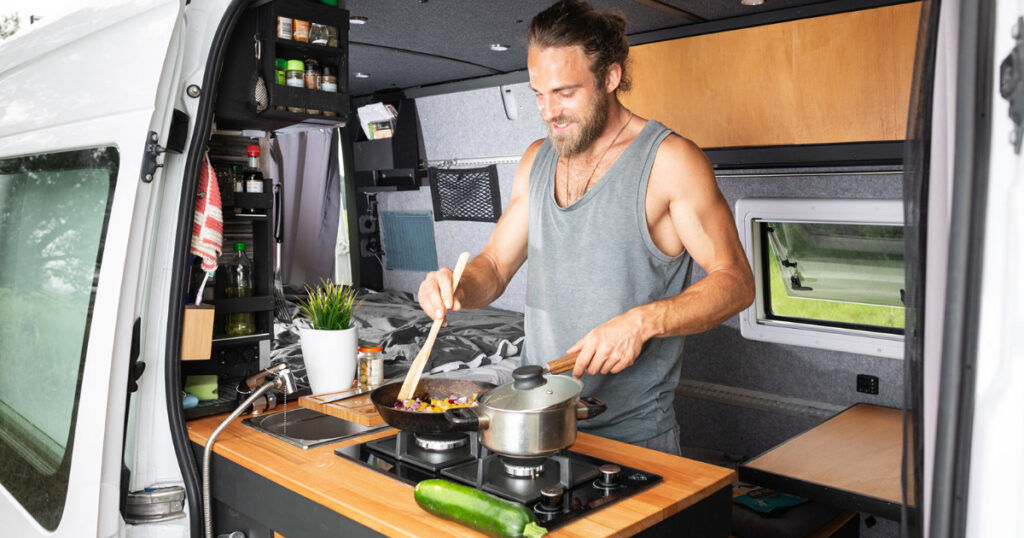Over the past decade, van life has rapidly grown from an obscure fringe lifestyle into a mainstream cultural phenomenon. With its promises of freedom, adventure, and closeness to nature, van life intrigues the imaginations of countless individuals who feel trapped by modern society.
Yet beyond the idealized images on Instagram, the reality of living nomadically in a van contains significant challenges. Vehicle breakdowns, finding safe overnight parking, loneliness, and discrimination are just some of the harsher realities of day-to-day #vanlife.
This article provides an extensive overview of van life. It explores the history of vandwelling, why people choose this path, what the lifestyle truly entails, pros and cons, costs, working and travel logistics, and more. Hopefully, the information presented here will help you make a knowledgeable decision about whether van life aligns with your personal goals and temperament.
What Exactly is Van Life?

Van life is an alternative lifestyle adopted by people who choose to live in vans or other vehicles that have been modified to serve as mobile tiny homes. The most basic van life vehicles contain amenities like a bed, a basic kitchen, a battery for electricity, storage, and possibly a heater. Some vans also include toilets, sinks, showers, ovens, solar power systems, computer workstations, air conditioners, and more luxurious features.
Vans are the most popular vehicles for van life, but many other types are used as well, including school buses, SUVs, pickup trucks, box trucks, old ambulances, camp trailers, RVs, and even cars. As long as you live in a vehicle that’s been customized to support daily life, you can be considered part of the van life community.
Van life means different things to different people. For some, it’s about embracing a nomadic lifestyle and the freedom of traveling at their own pace. For others, it’s about enjoying nature, living simply, focusing on hobbies, saving money on rent, or rejecting society’s expectations. There’s no single right or wrong way to do van life.
A Brief History of Van Life
Living in vehicles has existed for over a century. The history goes back to horse-drawn vehicles like gypsy caravans in Europe and covered wagons in America. The first use of the term “vandwellers” was in the late 1800s referring to traveling performers and the destitute living in vans.
After motor vehicles were introduced, van dwelling evolved with the times. During the Great Depression in the 1930s, house trailers gained mass popularity among families. In the 1960s, the counterculture movement led to an expansion of van living.
Contemporary van life really took off around 2010, when advances in technology enabled people to work remotely and share their adventures on social media. Especially Instagram, where hashtags like #vanlife inspired a new generation to embrace nomadic living.
Why Do People Choose Van Life?

There are many reasons why someone may decide to try van life:
- Freedom and flexibility to travel and live life on your own terms, without being tied to any one place. Van life allows you to change plans and go wherever you want.
- Adventure and excitement of not knowing where you’ll end up each day. Van life forces you outside your comfort zone.
- Lower cost of living since you aren’t paying rent or a mortgage. This allows faster debt payoff or savings.
- Chance to see nature by camping in beautiful locales and national parks.
- Focus on hobbies like surfing, climbing, hiking, and more since you can take your gear with you.
- Meet awesome people and join the open, accepting van life community.
- Live simply with fewer possessions. This can improve mental clarity.
- Gain new skills like woodworking, electrical, plumbing, and maintenance by building out your own van.
- Work and travel by either working remotely online or taking seasonal jobs.
- Be self-sufficient and reduce your environmental impact with solar power and other green technologies.
For digital nomads, minimalists, and adventurous spirits unwilling to follow the status quo, van life represents an enticing alternative lifestyle. The chance to take control and live life on your own terms is what draws many to this unconventional choice.
How to Get Started with Van Life
If you’re interested in giving van life a try, here are the basics on how to get started:
Choose a Van

Consider your budget, needs, and mechanical skills when selecting a van. Popular choices include Mercedes Sprinters, Ford Transits, and Ram Promaster. Older and cheaper options include Ford Econoline, Chevy Expresses, and used minivans.
Build Out the Interior

Design and build the bed, storage, electrical system, sink, counter, etc. to create your ideal mobile tiny home. You can DIY or hire a van conversion company. Expect to spend $5k-$15k.
Dial in the Details
Add small touches like curtains, decor, organizational systems, camping gear, cooking supplies, etc. to make the van feel like home.
Get Insurance
Ensure the van, belongings, and conversion for accidents, damage, and theft. Consider specialty van life insurance.
Make a Living
Line up an income stream through remote work, freelancing, seasonal jobs, a location independent business, etc.
Just Go!
Once your van is livable, it’s time to hit the road. Embrace uncertainty, go with the flow, and let the adventure begin.
The van life learning curve is steep. But with the right mindset and skills, you can make it work. Read van life blogs, join Facebook groups, watch YouTube, and learn from those who have done it.
Pros of Van Life
Van life comes with many benefits, including:
- Freedom and flexibility. Go wherever you want, whenever you want.
- Adventure. Explore new places and have exciting unknown experiences.
- Save money. Drastically lower your cost of living without rent or mortgage.
- Enjoy nature. Immerse yourself in beautiful natural settings.
- Focus on passions. Devote more time to hobbies like surfing, climbing, and hiking.
- Meet people. Join a community of like-minded adventurers.
- Live simply. Experience the benefits of minimalism.
- Learn new skills. Build your own tiny home on wheels.
- Make money traveling. Work seasonal jobs or online.
- Roadtrip ready. Always have your home and belongings with you.
- Own your home. Buy a van instead of renting or endless mortgage payments.
For the right person seeking freedom and adventure, van life can be an empowering and transformational experience.
Cons of Van Life
Van life also comes with some significant challenges:
- Small space. Vans max out at around 100 sq. ft. Lack of privacy and storage can be frustrating.
- Discomfort. You’ll deal with temperature extremes, cramped spaces, and poor weather.
- Fewer amenities. No large bed or couch. Limited cooking appliances and clothing storage.
- Finding parking. Not always easy to find legal, safe, free overnight parking. Stealth camping takes skill.
- Bathrooms. You’ll rely on gyms, campgrounds, and nature for showering and toilets.
- No routine. Traveling often means constantly changing schedules and locations. This gets tiring.
- Loneliness. Being alone in a van for long stretches can be socially and emotionally taxing.
- Discrimination. Some people will judge you for living in a vehicle. Cops may harass you.
- Upfront costs. Buying and building out a livable van is expensive, usually $10k+.
- Unpredictable costs. Breakdowns and repairs are common and expensive.
- Making money. You must figure out how to earn income consistently on the road.
Van life is far from an endless vacation or permanent Instagram feed. But if you stay flexible, embrace minimalism, and understand the challenges, the pros outweigh the cons for many adventurous individuals.
The lifestyle of a Van Lifer
The day-to-day lifestyle of van lifers looks very different from that of someone in a stationary home.

Here’s a glimpse at what van life is really like:
A Day in the Life
- Wake up in a new location almost every morning
- Make coffee and breakfast in the van’s kitchen
- Work online or at a seasonal job
- Explore the outdoors, exercise, pursue hobbies
- Cook simple meals in the van
- Relax by reading, playing music, and enjoying nature
- Socialize with other travelers and locals
- Find a safe new place to park and sleep each night
Working on the Road
Many van lifers pick up short-term jobs, do freelance work online, or run small web businesses to fund their lifestyles. Some workcamp at campgrounds or RV parks in exchange for free camping. Others take high-paying seasonal jobs like fruit picking, ski resorts, or Amazon warehouse work to save up, then travel freely after.
Bathrooms, Showers, Laundry
Options include gym memberships, campground facilities, solar showers, truck stops, free beach showers, and nature. Laundry can be done at campgrounds or laundromats.
Social Life
Other van lifers, campground neighbors, online forums, and social media provide the community. But you still spend a lot of time alone. Some find solitude peaceful, while loneliness can be a mental health strain for others.
Expenses
Expect costs for gas, vehicle payments, insurance, maintenance, cell service, food, camping fees, and more. With smart choices, the lifestyle can cost as little as $800 a month. But could be much more if you have an expensive vehicle loan and travel constantly.
Challenges
Making repairs, finding parking, dealing with weather, organizing gear, and errands take more effort than living in one spot. You must become more self-reliant. Coping with stress and uncertainty demands emotional resilience.
Van life offers freedom and adventure in exchange for comfort and convenience. The lifestyle appeals to those seeking alternative living arrangements and new perspectives. But it certainly isn’t for everyone.
Is Van Life Right For You?
Deciding if you should live in a van depends on your personality, values, and interests:
Van Life Is Great For:
- Adventurous spirits who crave travel, nature, and new experiences
- Those who enjoy the challenge of living simply with fewer possessions
- Self-reliant people able to handle uncertainties like repairs and finding parking
- Extroverts who won’t feel isolated and can easily meet other travelers
- People who love the outdoors and want to focus on hobbies like surfing, climbing, hiking
- Anyone seeking financial freedom from high rent/mortgage payments
- Those who work seasonal jobs like skiing, raft guiding, farming, tourism
- People with online businesses or remote jobs can work anywhere
- Folks who want to downsize and live a more eco-friendly, minimalist lifestyle
Van Life May Be Tough For:
- Anyone who highly values comfort, luxury, and having ample personal space
- People who need routines and have difficulty coping with frequent change
- Those with pets or kids (possible but takes planning and sacrifices)
- Introverts who value privacy and alone time (constantly meeting new people can be draining)
- People who aren’t very outdoorsy or self-reliant (you’ll rely less on others)
- Anyone without a solid remote job or a clear income stream
- Those who can’t easily adapt to new situations and problem-solve
- Folks who care a lot about appearances and social norms
- People who require specific amenities only found in a traditional home
The decision boils down to your personality, values, and life circumstances. If you’re realistic with yourself about the pros and cons, you can decide if van life is right for your needs.
Getting Started with Van Life
If you want to give van life a try, here are some tips:
- Rent a van for a trial run before fully committing. Some companies offer van rentals nationwide.
- Read blogs to dive deeper into the van life details and learn from seasoned van lifers.
- Join Facebook groups to connect with the community and ask questions.
- Watch YouTube channels to see the reality of van builds and life on the road.
- Make a plan for the build, including costs, income, insurance, mail, budget, etc. before diving in.
- Start small and simple with your build until you know what you really need.
- Be prepared for challenges and failures – things will not go smoothly at times.
- Consider part-time van life by keeping a home base if full-time seems too extreme.
- Have savings to cover emergencies and unexpected expenses in the beginning.
- Stay open to changing your plans and preferences once you get a feel for the lifestyle.
Take your time considering if van life is right for your goals and personality. Weigh all the pros and cons. And talk to as many experienced van lifers as you can to understand the reality before taking the leap.
FAQ
What are some of the best vans for van life conversions?
Some of the most popular vans for DIY camper conversions include the Mercedes Sprinter, Ford Transit, Ram Promaster, Chevy Express, Ford Econoline, Toyota Sienna, and older VW vans like the Westfalia. You can also convert less conventional vehicles like box trucks, ambulances, shuttle buses, SUVs, and even minivans.
How much does it cost to buy and build out a van for van life?
Expect to spend between $5,000 – $20,000+ on buying a used van and converting it into a camper. The price varies widely based on the van you select, DIY vs professional build, and included amenities. Going with a newer van and hiring a pro conversion shop will be vastly more expensive than a basic DIY build in an older van.
What are some ways to make money while living in a van?
Van lifers often use seasonal tourism jobs, freelance online work like web design or writing, location independent small businesses, workamping at campgrounds, or temporary gigs like Amazon warehouse jobs to fund their travels. Having a remote job with a steady income stream is ideal.
Where do people shower and use the bathroom when living in a van?
Common options include gym memberships, public showers at beaches or parks, campground facilities, installing your own outdoor or indoor shower, using a portable toilet or composting toilet, relying on nature when boondocking, or getting creative with baby wipes and temporary urine containers.
How do you cope with extreme hot or cold weather in a van?
Insulation, reflective window shades, ventilation fans, propane or diesel heaters, layering clothing, moving with the weather, parking in the shade, and using a hot water bottle or evaporative cooling towels can help manage temps. But you’ll never have as much climate control as a traditional home.
Is van life lonely? How can you meet other people on the road?
Meeting neighbors at campgrounds, connecting with the community online, attending van life gatherings, exploring tourist hubs, and having conversations on hiking trails can provide social bonds. But solitude is part of the lifestyle too. Introverts may struggle more with loneliness.
Conclusion
In the end, van life represents both a journey and a destination, often simultaneously. The learning curve never really ends, and you must remain open to growth and changes. But once you embrace the adventure and find enjoyment in the little moments between grand destinations, the path can be quite fulfilling.
Listen to experienced van lifers, understand the risks, start small, and don’t seek perfection. If you stay determined through the frustrations, van life grants you the opportunity to live boldly, intentionally, and freely. For some, hitting the road is a radical act of self-discovery and a chance to untether societal judgments. If van life speaks to your soul, take the leap and see where the open road leads you.

